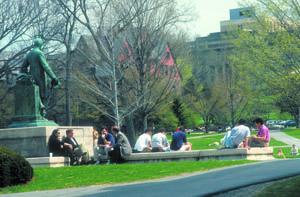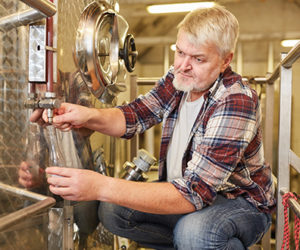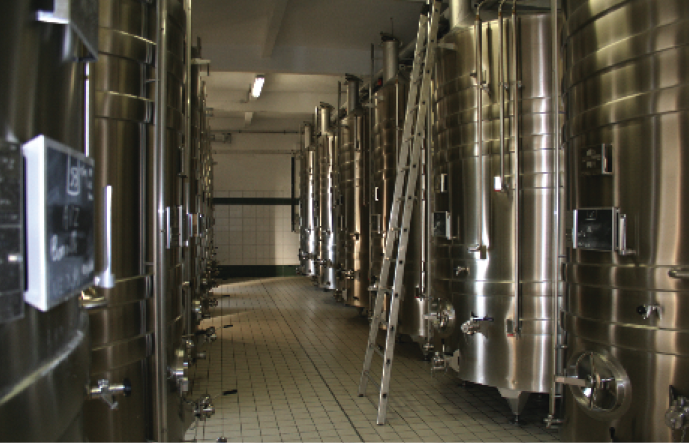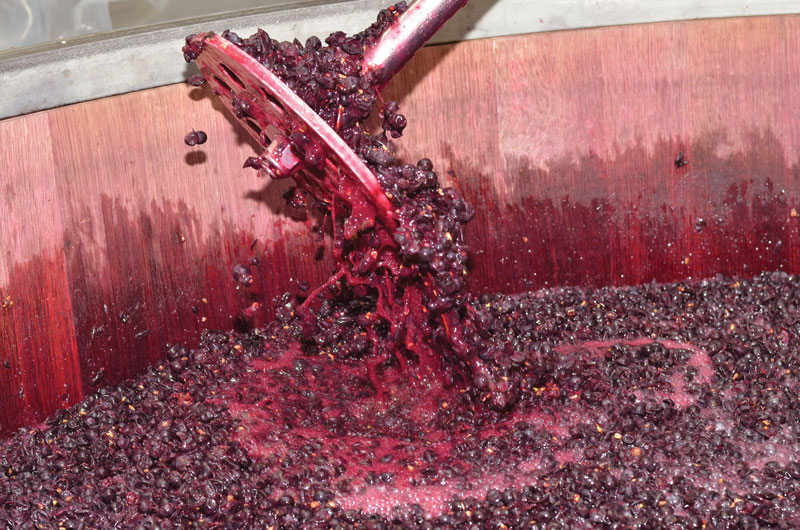The professional world of viticulture (grape growing) and enology (winemaking) has become its own amazing universe. To be part of it, there are two routes you can follow. The first is owning and operating your own vineyard. This requires not only good winemaking skills, but marketing savvy and business acumen. Your other option is to become an employee of an established winery. Armed with a college education, you can become a certified winery technician or vineyard manager. Or, if your aspirations are higher and you want to hit the ground running, you can get a bachelor’s degree in viticulture, enology or both. This education can get you not just a good job, but a great career.
Degrees in viticulture and enology
Going pro in the wine industry doesn’t always require a college or university degree, but having a degree or certificate improves your professional options. There are several levels of wine education available.
• A certificate or diploma is awarded by a community college or career school that offers some kind of viticulture or enology class. A program such as this may last several weeks to two years.
• An associate’s degree can be earned from a two- or three-year program in viticulture or enology, offered at a community college. Armed with an associate’s degree, a graduate can go pro in the wine industry as a vineyard manager or a winery technician.
• A person pursuing a bachelor’s degree would be enrolled in a university for a minimum of four years.
Courses in viticulture cover the events leading up to the harvest. These would include rootstock planting, soil management, vine physiology, pruning, pest and disease management, plant nutrition, trellising, training and harvesting. Courses in enology entail just about everything that happens to the grapes from the day you pick them until the wine is in the bottle. This would include fermentation science, the study of yeast, several avenues of microbiology, biochemistry and sensory evaluation (tasting).
• If you want to advance your education further, you could enroll in a graduate program. In a grad school, you would pursue a M.S. (Master of Science) or a Ph.D. (Doctor of Philosophy) in a specialized type of viticulture or enology. Many with this kind of degree in their back pocket have careers in research.
Where to study
There are several key viticultural appellations in the United States, and over 50 in all. Likewise, there are several in Canada, more in Australia, and a huge number in Europe, plus South America and South Africa. An appellation is a designated grape-growing area. Sonoma, Napa, Stellenbosch and Niagara are all appellations.
The overall objective of every appellation is to produce quality wine. Within many appellations you can find colleges and universities that teach viticulture and enology. Where you want to live or work can be a factor in deciding where you go to school.
There are a lot of schools that offer an education in viticulture and enology — many more than we can list here. This article will provide an overview. Now let’s go window-shopping.
UNITED STATES
The biggest viticultural regions in the United States are: California (featuring Sonoma and Napa); the Pacific Northwest (which includes Washington State, Oregon and a small portion of Idaho); followed by New York state and many smaller appellations scattered across America.
California
California has three significant universities geared to viticulture,
enology and the wine business — University of California at Davis (UC Davis), California State University at Fresno and Sonoma State University.
University of California at Davis
UC Davis is the largest teaching and research facility dedicated to grapes and wine in the Unites States. They offer a four-year undergraduate program in viticulture and enology for a bachelor of science degree, and a graduate program to acquire a master’s degree or Ph.D. in the deeper studies of genetics, microbiology, soil science and chemical engineering. In addition to microbiological labs, the university is equipped with a winery and has access to more than 120 acres of experimental vineyards.
Davis also has provision for students to follow an internship program for practical hands-on experience in the wine industry. Because of its high standards, graduates of the program go on to work as world-class winemakers, assistant winemakers, vineyard and winery managers or cellar masters. Some start their own wineries and many have established their own labels within 10 years of graduating.
California State U. at Fresno
California State University (CSU) at Fresno is internationally recognized, offering a world-class, four-year undergraduate and graduate program in viticulture and enology. Students graduate with a bachelor of science, or go on to pursue a master’s degree or Ph.D. in viticulture and enology. CSU operates its program in harmony with the Viticulture and Enology Research Center (VERC). The center is a leading applied research development and education facility. CSU has access to 160 acres of on-campus vineyards. Plus, students here are educated by working in the only licensed and bonded commercial winery on a university campus in the United States. Students can experience the complete winemaking experience, from growing grapes all the way to putting it in the bottle, marketing and selling the wine.
Sonoma State University
You can learn to make the best wine in the world, but what sells good wine is good business. Sonoma State University, located in the heart of America’s largest wine appellation, is the first university to offer a business program that caters exclusively to the business of wine. The university offers a bachelor’s degree in business administration for students interested in becoming part of the general managing team of a winery or owning their own. The Wine Business Program teaches you what you need to know about wine business strategy, human resources management, production operations, wine marketing, distribution and accounting. If you want up-to-date, cutting-edge business savvy, this is the place. The course includes field trips to other continents to study the business practices of wineries around the world and offers student internships for hands-on experience in running the business end of a winery.
The Pacific Northwest
In 1998, the state of Washington became America’s second-largest state in the production of Vitis vinifera grapes and wine. There are five appellations in the state and more on the drawing board.
Part of the state is semi-arid. Yet, unlike other semi-arid wine growing places, Washington also experiences cold. So, its grapes are susceptible to freeze injury. So schools in this area have an educational program that caters to local needs.
Washington State University
Washington State University has been involved in winegrape research since the 1960s, before the birth of the Washington wine industry. Over the years, they have developed multidisciplinary teams that deal specifically with the climate and varietal growing conditions of the Pacific Northwest. Their professional enology certificate consists of a series of 10 courses held over a two-year period. The viticulture certificate also consists of a 10-course series over two years.
In addition, the University interfaces its viticulture and enology programs with economic and business principles that will help you to run your winery someday.
Walla Walla Community College
In January 2000, this community college opened the Institute of Enology and Viticulture. The institute offers college courses that lead to either a one-year professional certificate or a two-year associate’s degree in enology and viticulture.
Along with its internship program, a very attractive feature of the institute is its certified laboratory and the full production teaching winery and vineyard currently under construction. The teaching vineyard under development will also feature a certified nursery and several acres of wine grape varietals. The teaching vineyard will be able to demonstrate a variety of water-application systems, trellising systems and a wind machine.
Many of the college courses are tailored to the specific wine-growing needs of the Pacific Northwest. Beyond viticulture and enology, the institute offers courses in sensory evaluation, wine appreciation, wine consumer education and hospitality training.
Oregon State University
Oregon’s wine history goes back over a hundred years. There are currently eight winemaking regions in the state, which makes Oregon America’s fourth-largest wine producer. Oregon State University (OSU) offers an undergraduate degree in food science and technology with an option for students to specialize in fermentation science. Here a student would learn the biological, chemical and physical principles of fermentation. OSU has an enology laboratory and a pilot plant winery.
New York State
New York State is currently the third-largest wine-producing area in America. There are four large viticultural appellations in New York state with over 100 wineries and counting.
Cornell University
Established by the New York State Agricultural Experiment Station at Cornell University, this is the only center for research on wine production in the state. The program works in conjunction with the new Cornell Vinification and Brewing Technology Laboratory, a pilot plant dedicated to research and teaching in wine science. The program provides workshops and education in wine microbiology in a place where Cornell students can conduct research and learn winemaking on industrial equipment.
Elsewhere in America
Beyond these large wine appellations, there are scores of smaller appellations and related education programs all over the country. Here are just two examples.
Indiana and Virginia
In the heart of the Midwest, Indiana is home to more than 200 acres of vineyards. As a result, the School of Agriculture at Purdue University has included the study of grapes in its curriculum of small fruit production. Undergraduates here pursue a BS in horticulture. Purdue also has an enology lab. Undergraduates can pursue a BS in food science with a focus on winemaking.
The Enology and Grape Chemistry Group at Virginia Tech is part of the Department of Food Science and Technology. It exists to support the growing grape and wine industry in Virginia. Since Virginia’s appellation endures a wet season and conditions that induce rot and rapid growth, students focus their studies on challenges to grape quality as they pertain to the wine industry of Virginia’s appellation.
CANADA
There are several viticultural appellations in Canada, but the two largest are the Niagara Peninsula in Ontario, and the Okanagan Valley in British Columbia.
Brock University
Instrumental in getting Canada on the map is the Cool Climate Oenology and Viticulture Institute at Brock University. What makes Brock unique is that it also combines courses in marketing and includes opportunities for industry experience through co-op work. Students are expected to complete one work term in a vineyard setting, and another term at a winery during harvest and at crush. This allows individual students to discover where their interests lie, helping them make informed decisions about their career. As well, many employers use co-op programs to identify and recruit their future permanent workforce.
Niagara College
Niagara College, also located in Niagara wine country, offers a winery and viticulture technician diploma. This two-year college program is designed to help students find careers as winery and cellar technicians, assistant vineyard managers and wine sales and marketing representatives. The college has included a supervised placement program with wine industry employers that puts students into the thick of it during the four months of harvest. Niagara College has also developed a partnership with Brock University for a joint teaching program and has opened a fully certified teaching winery and vineyard.
THE SOUTHERN HEMISPHERE
The University of Adelaide (U of A) is also the home of the Australian Wine Research Institute. Because of Adelaide’s association with the institute, and its close proximity to over 50% of the winemaking areas of Australia, U of A is becoming a leader in wine education and research.
Other universities include the University of Western Australia, where undergraduate students can pursue a B.S., M.S. or Ph.D. in a variety of viticulture and enology programs.
The demand for wine education is also being met at Charles Sturt University and the advanced technology of its National Wine and Grape Industry Center. Undergraduates pursuing a B.S. enjoy hands-on experience in the 12-hectare vineyard and fully commercial winery.
The Muresk Institute of Agriculture at Curtin University in Western Australia offers a two-year associate’s degree in viticulture or a three-year B.S. degree in viticulture and enology. Both programs include experience in vineyards, cellars and wineries.
A stone’s throw from Australia, New Zealand’s Tairawhiti Polytechnic offers a wine industry certificate course in viticulture and enology using a modern commercial winery and laboratory.
To the east, across the Pacific, are the vineyards of Chile. With its Pacific coast on one side and the Andes on the other, Chile provides an ideal Mediter-ranean-type winegrowing climate free from most major vineyard diseases.
Chile offers educational facilities at the University of Talca, with its degree program in viticulture and enology and additional wine business classes. (Incidentally, these classes collaborate closely with the wine business undergraduates of Sonoma State University.)
Across the Atlantic, the University of Stellenbosch — in the heart of South Africa’s increasingly famous wine region — offers South Africa’s only undergraduate program of viticulture and enology. The University of Stellenbosch provides hands-on experience to students through local vineyards and a wine cellar.
FRANCE AND EUROPE
Although Europe is mentioned last in this article, it is by no means the least important. The serious wine industry started in Europe centuries ago. Today, France sets the standards in the wine industry and has been doing so for a long time.
In Bordeaux alone there are four universities. All of them contribute to the wine industry, but the enology faculty at Universite Victor Segalen Bordeaux 2 has been in existence since 1880, in the days of Louis Pasteur. If you’ll recall, it was Louis’ discovery that really got things going in the fermentation department, and to this day this university still retains the cutting edge. The university accommodates international students and offers helpful information on admission and accommodations for foreigners.
As part of the University of Burgundy, Institut Jules Guyoy bears the name of the great pioneer of scientific viticulture and is devoted to both education and research. With its own vineyard and winery, this facility focuses on particular concerns specific to France’s northern vineyards. But in the south of France, in Montpellier, Universite Paul Valery also offers an enology degree program, which focuses its technology on the wine industry in France’s southern climates.
And of course, what is France without Champagne? The Laboratoire d’oenologie in Reims offers a dedicated program in research and education for microbiology and production of the effervescent beverages.
Summing up
This article is by no means exhaustive. To include every opportunity to learn winemaking, we’d end up with something as thick as a phone book. However, for your convenience, we’ve provided a sidebar with contact information for all of the colleges and universities mentioned in the story (see page 44). All of the information in this article was taken from each institution’s catalog, brochure or Website and was accurate at press time to the best of our knowledge.
So, do you still want to go pro? If so, you’re about to begin an amazing career.





